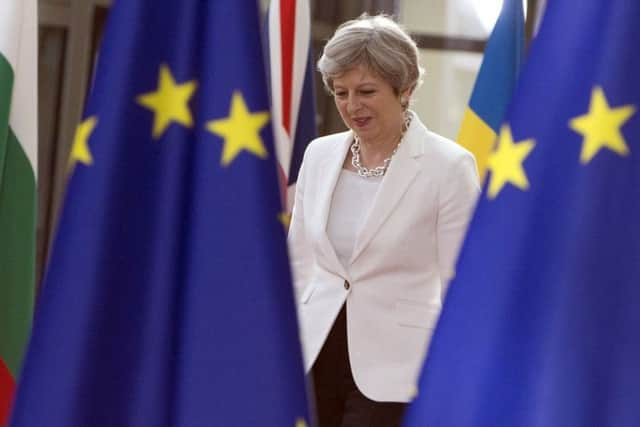PM woos European leaders as Juncker appears to rule out October trade talks
Attending the Tallinn Digital Summit in Estonia today, Mrs May held a series of bilateral meetings with fellow heads of state, including German Chancellor Angela Merkel and Polish Prime Minister Beata Szydło.
It follows meetings with European Council President Donald Tusk and Irish premier Leo Varadkar this week, as EU leaders prepare to assess how much progress has been made in the first phase of talks on the UK’s withdrawal.
Advertisement
Hide AdAdvertisement
Hide AdBritish officials are eager for negotiations to move on to discussions about the UK’s future relationship with the EU – but speaking at the same summit, Mr Juncker said it would take a “miracle” for Brussels to agree to proceed to the next phase.


The European Union has been insistent on staggering talks since the formal Article 50 process began. It has demanded that “sufficient progress” be made on issues relating to the UK’s withdrawal – including the rights of EU citizens, the divorce bill and the Northern Irish border – before they can move on to trade.
Representatives of the remaining 27 member states are expected to decide whether to give the go-ahead for the next stage of negotiations when they descend on Brussels for the next meeting of the European Council on October 19.
However, it is looking increasingly likely that they will put their foot down and demand more clarity on the future role of the European Courts and Britain’s financial contributions to the bloc.
Advertisement
Hide AdAdvertisement
Hide AdFollowing a visit to Downing Street on Tuesday, Mr Tusk told reporters that while both sides were “working hard” to reach an agreement “there is no ‘sufficient progress’ yet”.


Mr Varadkar cast further doubt on early trade talks on Thursday, when he said the October deadline to enter the next phase was looking “very challenging”.
Mr Juncker appeared to put the nail today, when he marked the end of the fourth round of formal negotiations by stating that “there will be no sufficient progress” before the October 19 meeting “unless miracles would happen”.
“By the end of October we will not have sufficient progress,” he said.
Advertisement
Hide AdAdvertisement
Hide AdTheir comments come despite the guarantee offered by Mrs May in her Florence speech last week that no member state “will need to pay more or receive less” from the EU budget as a result of the UK’s decision to leave.
She also used the speech to confirm that the final agreement on the rights of EU citizens living and working in Britain would be written into UK law.
Speaking at the Tapa military base in Estonia this morning, the Prime Minister provided further assurances that Britain remains “unconditionally” committed to the collective defence of Europe.
She said: “Our resolve to draw on the full weight of our military, intelligence, diplomatic and development resources to lead international action with our partners on the issues that affect the security and prosperity of our peoples is unchanged.
Advertisement
Hide AdAdvertisement
Hide Ad“And our determination to defend the stability, security and prosperity of our European neighbours and friends remains steadfast.”
In a meeting with Mrs Merkel later that day, the leaders discussed the importance of settling the issue of citizens’ rights “at the earliest opportunity”. A Downing Street spokesman said Mrs May also emphasised the need to agree a”time-limited” transition period after Brexit “to provide certainty to businesses and others in both Britain and the EU”.
In a separate meeting with Mr Szydło, Mrs May agreed on the importance of Poland “having a strong relationship with the UK after Brexit” highlighting the two countries’ “many shared projects, family ties and history”. She also said she “wanted to give certainty to Polish and other EU citizens living in the UK”.